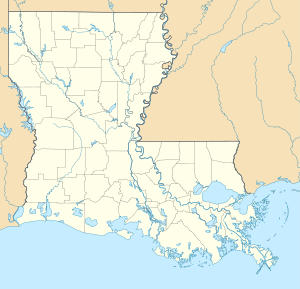
Back حملة النهر الأحمر Arabic Campagne de la Red River French Campagna del Red River Italian レッド川方面作戦 Japanese Red Riverveldtocht Dutch Kampania na Red River Polish Кампания Ред-Ривер Russian Chiến dịch Red River Vietnamese
| Red River campaign | |
|---|---|
| Part of the American Civil War | |
 Banks' army crossing the Cane River, March 31, 1864 | |
| Operational scope | Strategic offensive |
| Location | 32°0′39″N 93°39′54″W / 32.01083°N 93.66500°W |
| Commanded by | |
| Objective | Capture of Shreveport |
| Date | March 10 – May 22, 1864 |
| Executed by | Department of the Gulf |
| Outcome | Confederate victory |
The Red River campaign, also known as the Red River expedition,[1] was a major Union offensive campaign in the Trans-Mississippi theater of the American Civil War, the campaign taking place from March 10 to May 22, 1864. It was launched through the densely forested gulf coastal plain region between the Red River Valley and central Arkansas towards the end of the war. The offensive was intended to stop Confederate use of the Louisiana port of Shreveport, open an outlet for the sugar and cotton of northern Louisiana, and to split the Confederate lines, allowing the Union to encircle and destroy the Confederate military forces in Louisiana and southern Arkansas. It marked the last major offensive attempted by the Union in the Trans-Mississippi Theater.
The expedition was a Union military operation, fought between approximately 30,000 federal troops under the command of Major-General Nathaniel P. Banks, and Confederate forces under General E. Kirby Smith, whose strength varied from 6,000 to 15,000. The Battle of Mansfield was a major part of the Union offensive campaign, which ended in defeat for General Banks.
The expedition was primarily the plan of Major General Henry W. Halleck, former General-in-Chief of the Armies of the United States. A diversion from Lieutenant-General Ulysses S. Grant's plan to surround the main Confederate armies by using Banks' Army of the Gulf to capture Mobile, it was characterized by poor planning and mismanagement, and led to bitter enmity between Major-General Richard Taylor and his immediate superior, Kirby Smith, after Smith ordered Taylor to send half of his army to north to Arkansas, rather than south in pursuit of Banks, following the battles of Mansfield and Pleasant Hill.
- ^ U.S. Cong. Joint Comm. Cond. War, 1865, p. III.
